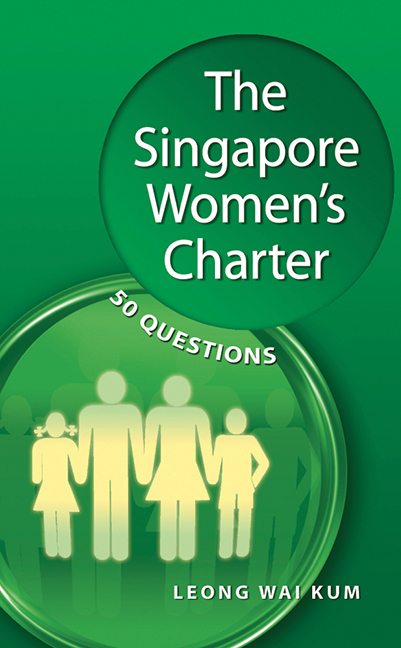Book contents
- Frontmatter
- Contents
- List of Questions
- Foreword
- Preface
- Part I What is the Women's Charter?
- Part II Marriage
- Part III Regulation of Husband-Wife Relationship
- Part IV Regulation of Parent-Child Relationship
- Part V Violence in the Family
- Part VI Divorce and the Process
- Part VII Maintenance
- Part VIII Division of Matrimonial Assets
- Part IX Muslims
- Epilogue
- References
- Index
- About the Author
- Frontmatter
- Contents
- List of Questions
- Foreword
- Preface
- Part I What is the Women's Charter?
- Part II Marriage
- Part III Regulation of Husband-Wife Relationship
- Part IV Regulation of Parent-Child Relationship
- Part V Violence in the Family
- Part VI Divorce and the Process
- Part VII Maintenance
- Part VIII Division of Matrimonial Assets
- Part IX Muslims
- Epilogue
- References
- Index
- About the Author
Summary
What does the Women's Charter require of two persons who want to marry each other?
Two sets of requirements
The Women's Charter makes two sets of requirements for those who wish to marry. One concerns the formalities of marrying, and the other relates to each party's capacity to marry the other.
The requirements of formalities refer to the minimum process the two persons must undergo in order to become married under the law. While the couple will usually also engage in other social functions with their family members and friends as part of their wedding, these additional social functions do not form part of the minimum legal formalities. The requirements relating to capacity to marry refer to the personal characteristics legally required of the couple so they possess full capacity to decide responsibly whether to enter into marriage.
Fulfilling both sets of requirements
It is only when a couple both fulfils the formalities as well as possesses the capacity to marry that the marriage is completely valid under the Women's Charter. Failing to comply with either requirement means a valid marriage will not result. Lawyers say that a valid marriage results only when two persons who possess the capacity to marry each other comply with the legal process of marriage.
Consequences of failure of compliance
Failing to comply with any requirement can lead to one or more of several legal consequences.
A most severe legal consequence follows the failure to comply with the most important of the formalities of marriage or any of the requirements of capacity to marry: the resulting marriage is completely invalid. Lawyers call such an invalid marriage by the somewhat contradictory term of “void marriage”. Despite the contradiction within the term, it is useful in conveying the idea that, in fact, no marriage had ever taken place.
Then the Women's Charter identifies several causes of invalidity which, if they exist, allow the two parties to this “voidable marriage” to choose whether to apply to court to have their marriage annulled, or not to apply to court in which case their marriage continues as if it were a perfectly valid marriage. A voidable marriage may, at the parties’ choice, either be made completely void, or it may continue as a completely valid marriage if they do not act to make it void.
- Type
- Chapter
- Information
- The Singapore Women's Charter50 Questions, pp. 11 - 24Publisher: ISEAS–Yusof Ishak InstitutePrint publication year: 2011

